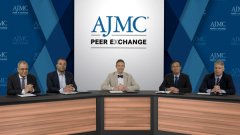
Key Toxicity Profiles in the Treatment of HCC
Dr Haumschild leads a discussion surrounding toxicity profiles specifically related to HCC.
Episodes in this series

The experts in this part of the discussion focus on the various therapeutic approaches and resource allocation for managing toxicities in hepatocellular carcinoma (HCC) treatment. They delve into the diverse toxicity profiles associated with different therapeutic approaches, including tyrosine kinase inhibitors (TKIs), monoclonal antibodies, and immunotherapy. These treatments can lead to a range of adverse effects, such as skin reactions, hypertension, and gastrointestinal issues. They emphasize the importance of education and vigilance in managing these toxicities, especially in the context of immunotherapy, where immune-related adverse events can affect multiple organs.
The conversation then shifts to resource allocation and the challenges in managing treatment-related toxicities. The experts highlight the complexity of addressing adverse effects in HCC patients, particularly those undergoing TKI and immunotherapy. They stress the need for comprehensive supportive care and continuous patient education, as well as the involvement of payers and other support systems to ensure effective management. The extensive nature of these treatments requires a long-term follow-up and engagement plan, which can be financially and laboriously intensive.
The panel also emphasizes the importance of established treatment regimens that require tailored counseling for patients. They stress the significance of continuous monitoring and the involvement of various specialists, such as dermatologists, in managing the wide array of adverse events that can arise during treatment. The multidisciplinary team approach is highlighted as crucial for effectively addressing the complexities and individualized needs of each patient.
Abou-Alfa emphasizes the critical role of human resources and effective communication in managing toxicity profiles. He emphasizes the importance of patient communication and encourages patients to promptly report any symptoms, ensuring a proactive and patient-centric approach to managing adverse events. He stresses the significance of investing in human capital to build strong patient relationships and facilitate better outcomes.
The experts collectively highlight the challenges posed by unforeseen adverse events and underscore the need for continuous monitoring and timely intervention. They stress the significance of promptly addressing intensifying symptoms and the importance of a collaborative approach involving the multidisciplinary team in the management of HCC. Dietrich emphasizes the importance of understanding the individualized nature of toxicity management and the need for tailored approaches to address the specific needs of each patient.
In conclusion, the discussion sheds light on the complexities involved in managing the toxicity profiles associated with various therapeutic approaches in HCC treatment. It underscores the critical role of education, patient communication, and proactive monitoring in ensuring effective management. The experts highlight the need for a multidisciplinary approach and comprehensive support systems to address the challenges posed by treatment-related toxicities in HCC.
Video synopsis is AI-generated and reviewed by AJMC editorial staff.
Newsletter
Stay ahead of policy, cost, and value—subscribe to AJMC for expert insights at the intersection of clinical care and health economics.










